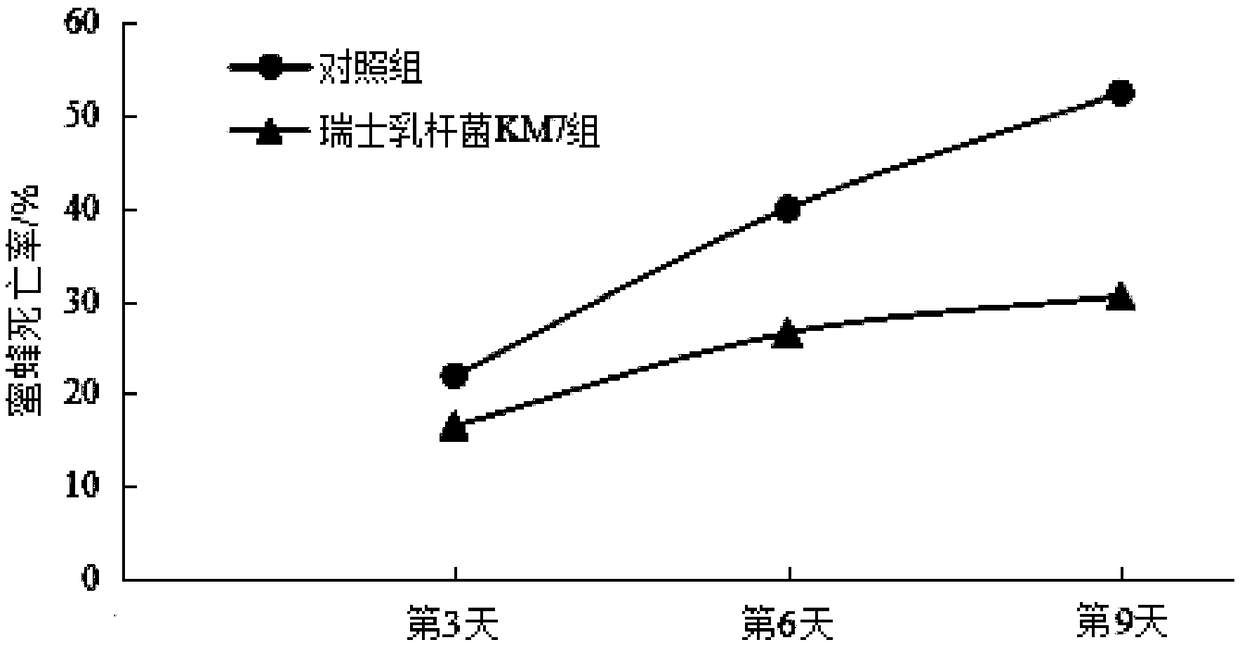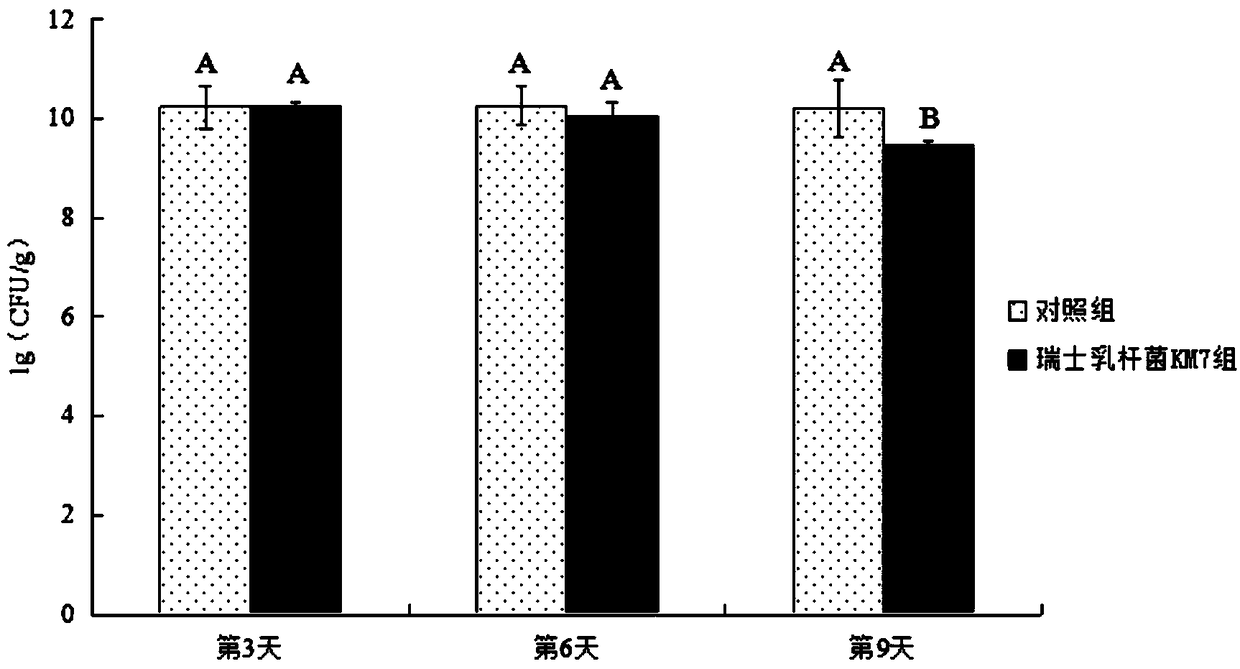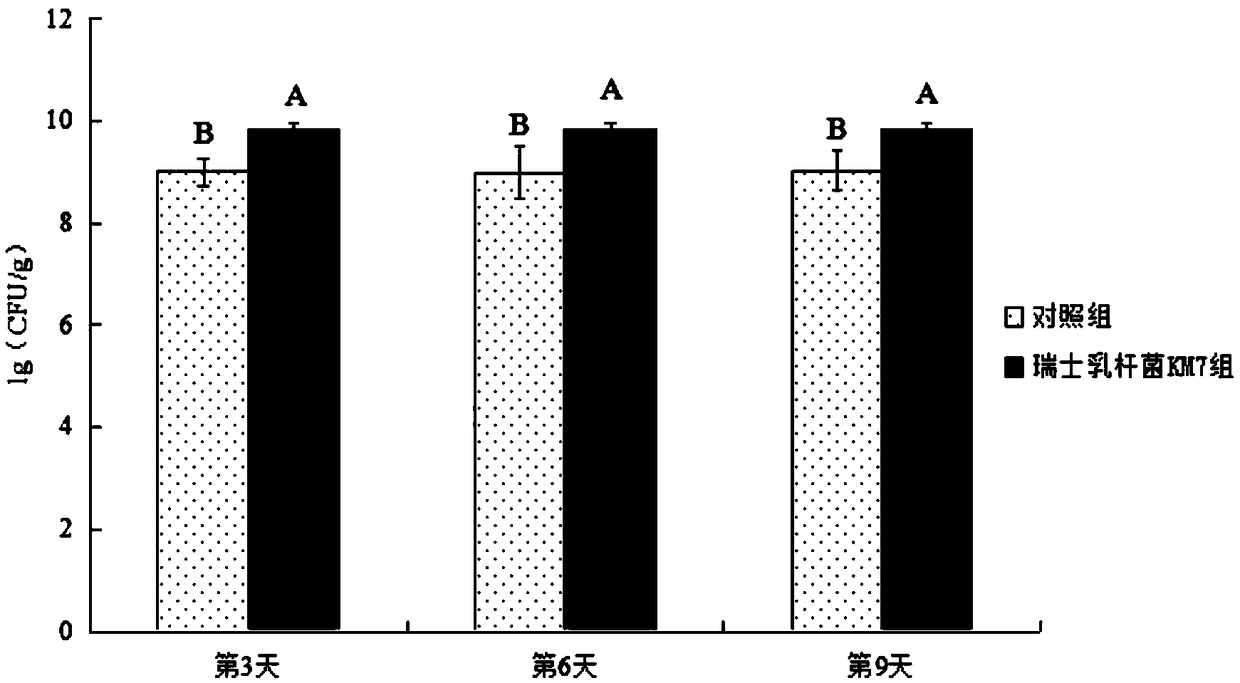Lactobacillus helveticus and application thereof in bee breeding process
A Lactobacillus and bee technology, applied in the biological field, can solve the problems of intestinal flora microecological imbalance, enhance the resistance of intestinal microorganisms, bee death, etc., to improve the flora microecological structure and enhance the intestinal immunity of bees. strength, and the effect of improving survival
- Summary
- Abstract
- Description
- Claims
- Application Information
AI Technical Summary
Problems solved by technology
Method used
Image
Examples
Embodiment 1
[0025] Screening and Identification of Lactobacillus helveticus KM7
[0026] (1) Screening of Lactobacillus helveticus KM7
[0027] (1) Collection of samples
[0028] Put healthy adult worker bees of Apis mellifera randomly captured from the beekeeping farm of the Department of Apiology, College of Animal Science and Technology, Yunnan Agricultural University, Kunming, Yunnan Province, into a 50mL sterilized centrifuge tube, insert carbon dioxide until the bees are comatose, and place them on the ultra-clean workbench. The bees were internally fixed, and the intestines of the bees were taken out with tweezers and transferred into a 1.5mL sterilized centrifuge tube, and stored in a 4°C refrigerator for later use. The equipment used in the experiment was sterilized with ultraviolet light and 75% ethanol.
[0029] (2) Screening of lactic acid bacteria
[0030] Under sterile conditions, the gut samples of healthy adult worker bees of Apis mellifera were taken, added to 10 mL of ...
Embodiment 2
[0039] Probiotic Properties of Lactobacillus helveticus KM7
[0040] (1) Antibacterial properties of Lactobacillus helveticus KM7
[0041] The inhibitory effect of Lactobacillus helveticus KM7 on the growth and reproduction of main intestinal pathogenic bacteria was studied by agar punching diffusion method. Lactobacillus helveticus KM7 was inoculated in MRS broth medium, anaerobically cultured at 37°C for 24 hours, and the number of bacteria was adjusted to 10 with MRS broth medium. 8 CFU / mL; 4°C, 5000rpm, centrifuge for 10min, collect the supernatant; filter the supernatant through a 0.22μm microporous membrane, adjust the pH to 6.2 with sodium hydroxide; incubate 20μL for 24h with a concentration of 1×10 8 CFU / mL indicator bacteria solution (Escherichia coli, Salmonella typhimurium, Shigella flexneri) was added to the LB solid medium sterilized by high temperature and high pressure and cooled to about 45°C, mixed vigorously and quickly poured into a plate After the cultur...
Embodiment 3
[0050] Effects of Lactobacillus helveticus KM7 on the growth and intestinal health of adult worker bees of Apis mellifera
[0051] (1) Effect of Lactobacillus helveticus KM7 on the mortality of adult worker bees of Apis mellifera
[0052] 300 healthy adult worker bees of Apis mellifera were captured from the apiary of Yunnan Agricultural University and randomly divided into two groups. 8 CFU / mL Lactobacillus helveticus KM7 sugar water; the control group and the experimental group were raised in two self-made incubators respectively, and sufficient sugar and water supply were ensured during the experiment; on the 3rd, 6th, and 9th days of the experimental period, The bee mortality of the control group and the experimental group were counted respectively. Experimental results such as figure 1 As shown, with the increase of experimental age, the mortality of bees in the experimental group and the control group gradually increased; but on the 3rd, 6th, and 9th day, the mortalit...
PUM
| Property | Measurement | Unit |
|---|---|---|
| Radius | aaaaa | aaaaa |
| Radius | aaaaa | aaaaa |
| Radius | aaaaa | aaaaa |
Abstract
Description
Claims
Application Information
 Login to View More
Login to View More - R&D
- Intellectual Property
- Life Sciences
- Materials
- Tech Scout
- Unparalleled Data Quality
- Higher Quality Content
- 60% Fewer Hallucinations
Browse by: Latest US Patents, China's latest patents, Technical Efficacy Thesaurus, Application Domain, Technology Topic, Popular Technical Reports.
© 2025 PatSnap. All rights reserved.Legal|Privacy policy|Modern Slavery Act Transparency Statement|Sitemap|About US| Contact US: help@patsnap.com



